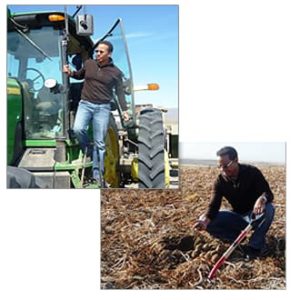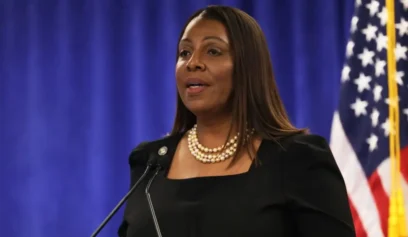
President and CEO of Thompson Family Farms, Robert Thompson. Photo courtesy of ThompsonFamilyFarms.net
Black-owned farms are few and far between, comprising just 1 percent of the industry. However, one family farm is working to become a leading produce supplier to some of America’s major food corporations.
In 2004, Robert Thompson, a former Fresh Del Monte Produce marketing executive, founded Thompson Family Farms, Black Enterprise reports. Thompson serves as the Washington-based company’s president and CEO, while the farm is run by his wife Clarissa, son Stewart, and daughters Arielle and Athena.
According to Black Enterprise, Thompson dug into the business after colleagues, who happen to be second-generation potato growers, convinced him that producing potatoes would be more profitable than growing lettuce, which was his original plan.
Now, TFF is a major potato supplier for large food-processing corporations like McDonald’s and Burger King. About 60 percent of TFF’s revenue comes from providing the potatoes Burger King uses for its french fries, the news site reports.
Through expanded business ventures with new and existing clients, Thompson says he hopes to boost the farm’s profits to $10 million by 2018.
“We want to continue to show folks that the little guy can compete with quality,” Thompson said. “Thus far, it has been a good plan and hopefully will help us continue to grow our business.”
Per Black Enterprise, the former marketing executive also said that minority-owned businesses often make the mistake of focusing their efforts on what they can do for the customer rather than how they can meet the needs of the company.
“Instead, we researched their business needs and matched them up to our core competencies to offer a value proposition to McCain and a service we could deliver,” Thompson explained.
For instance, McCain Foods USA, a supplier of frozen potato and snack food products in Illinois, teamed up with Thompson’s farm because it could produce potatoes that met McCain’s specific color, consistency and quality standards, Black Enterprise reports.
TFF’s primary clients also include agribusiness J.R. Simplot Co. and the Frito-Lay Company, located in Dallas.
But a farming business like Thompson’s would have been almost impossible back in the day, as the U.S. Department of Agriculture discriminated against African-American farmers by refusing to grant them farm loans. According to Black Star News, factors like “tax sales, inaccessibility to legal counsel, and legally exploitative land takings” also led to the sharp decline in African-American land ownership.
The news website also reports that today, African-Americans only own about 7 million acres of land.
“We are losing land and wealth that our parents, grandparents and great grandparents worked, fought and died to acquire for us,” said Gary Grant, National President of the Black Farmers and Agriculturalist Association. “We owe our ancestral warriors a debt. We must help ourselves by insuring that the next generation is ready to control the land.”
Grow Where You Are seeks to do just that. The Georgia-based farming collective has nine members who run a 3-acre farm and food forest in Atlanta as well as another 5-acre farm in Stone Mountain, Raw Story reports. Two-thirds of the group’s farmland is owned by churches, who provide members and food pantries with a portion of their produce. According to its website, Grow Where You Are has also “produced over 15,360 lbs of food, served over 8,260 people with healthy food options and facilitated over 144 service groups. ”
Other Black-owned farming collectives include the Black Dirt Farm in Preston, Maryland; the Alabama-based Tuskegee United Leadership and Innovation Program (TULIP); and the Hattie Carthan Herban Farm in Brooklyn.


